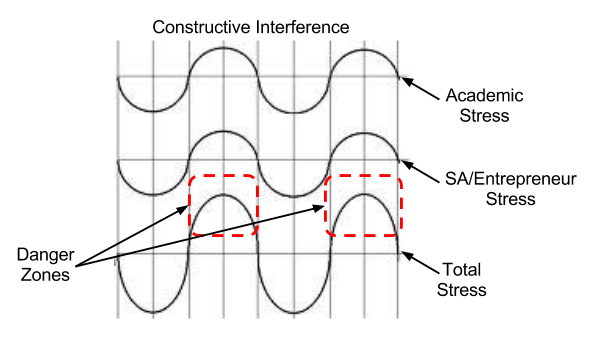Is It Ever Okay to Skip Class? A Two-Minute Checklist for the Student Entrepreneur
By Blake Marggraff
When it comes to balancing your efforts as a student entrepreneur and campus ambassador with school, choices that once seemed black and white suddenly tend to blend together. Sure, a few late nights (early mornings?) here and there don’t seem too bad, but in a world where assignments and exams already fluctuate in waves, balancing education and venture frequently collide quite similarly to constructive interference in electromagnetic radiation.
As you can see in the the diagram (courtesy of Signal Harbor), constructive interference occurs when nasty midterms and demanding group projects synchronize with startup deadlines and even Student Ambassador (SA) assignments to create Danger Zones. Side effects of exposure CIDZ (Constructive Interference Danger Zones) may include nervousness, irritability, excessive coffee consumption, and for some individuals, premature balding has been observed.
It’s this kind of stress and situation when you, the driven, intelligent, and probably over-committed student entrepreneur, to ask, “Should I skip class?”
Fortunately for you, we’ve got a checklist that will make your decision a lot easier. Before we get there though, let’s lay out some ground rules. Specifically, there are several situation where skipping class is probably not only a poor use of time, but also a dangerous and expensive choice that will cost you in the long run.
-
NEVER skip class just to study for an exam in that class later that day. Professors have a strange habit of covering material that will be on their exams up to and including the very last lecture, either intentionally or otherwise.
-
Don’t sleep through a class, unless your health and medical well being depends on the extra hour or two or rest you’ll get. It’s just not worth the time you’ll spend catching up on missed lectures, or worse, trying to study what was covered without notes or a recorded video.
-
Try your best not to miss classes where participation or attendance is noticeable or important for your grade. As obvious as this seems, but being in good standing with your professors and going for the easy hand-raise points makes a difference.
Additionally, the old concept that you can just get notes from a friend should finally be taken off life support and be allowed to die peacefully. You’ll only get the full classroom experience if you’re actually in the classroom. Yes, ladies and gentlemen, the first rule of tautology is the first rule of tautology.
And now for the moment you’ve all been waiting for! To use this checklist, give each bullet point below a score of 1-5 (don’t worry, you can give the same score to multiple items); 1=Strongly Disagree, 3=Neutral 5=Strongly Agree. When you’re done, match your score with the Skipping Key to see if you should consider skipping class.
-
The class I might skip contains information relevant to my startup or entrepreneurial interests.
-
The class I might skip is tough, and I’m not sure I’m on track for the grade I want.
-
The class I might skip is small enough that the Professor would notice my absence.
-
The class I might skip counts attendance toward part of the overall grade.
-
The class I might skip has a review/recitation session that I’ll certainly attend.
-
I have used my previous 24 hours as efficiently as possible (working diligently ≥16 hours)
-
I have attended just about all of my previous lectures.
Alright, now, add up your responses for bullets 1, 2, 3, and 4. Then, subtract the sum of responses from bullets 5, 6, and 7 from the first total.
Put another way: (#1+#2+#3+#4)-(#5+#6+#7)= Your Skipping Score.
Skipping Key:
|
Score |
Should you Skip? |
|
-11 to -8 |
Okay, maybe you’ve earned it. Go ahead, skip just this once, and make sure it doesn’t happen again! |
|
-7 to -3 |
Hm, this is a close one. Go if you can, and whatever you do, make sure you don’t forget to catch up on the material. |
|
-2 to 17 |
Holy guacamole, don’t even think about it! Tough it out, get some rest when you can, and take a look at your schedule to see what’s causing the most stress and sucking up your time. |
So there it is. Keep in mind, as with any decision you make as a self-directed student and young entrepreneur, everything we’ve discussed should be taken with a grain of salt the size of Yosemite’s Half Dome. In the end, just ask yourself: will any negative ramifications of your choice justify the benefits, both short and long-term?
 Blake Marggraff is a University Innovation Fellow and a graduate of Washington University in St. Louis. Prior to attending Washington University, Blake won the top award at Intel’s International Science and Engineering Fair with a project that used pegylated tin to augment the efficacy of radiation therapy for treatment of simulated cancer cells with low to mid-energy X-ray sources. Blake’s enthusiasm for entrepreneurship began with his success in numerous public speaking competitions, and was furthered by his work as a leader of local National Youth Leadership Training courses. Looking toward the future, Blake intends to help shape the bioethics and consumer biotechnology industries, while inspiring peers to engage in entrepreneurship.
Blake Marggraff is a University Innovation Fellow and a graduate of Washington University in St. Louis. Prior to attending Washington University, Blake won the top award at Intel’s International Science and Engineering Fair with a project that used pegylated tin to augment the efficacy of radiation therapy for treatment of simulated cancer cells with low to mid-energy X-ray sources. Blake’s enthusiasm for entrepreneurship began with his success in numerous public speaking competitions, and was furthered by his work as a leader of local National Youth Leadership Training courses. Looking toward the future, Blake intends to help shape the bioethics and consumer biotechnology industries, while inspiring peers to engage in entrepreneurship.






Leave a Reply
Want to join the discussion?Feel free to contribute!